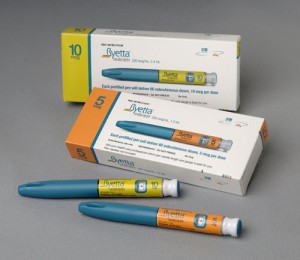 Patients with type-2 diabetes who take Byetta (exenatide) to lower their blood-sugar may have a higher risk of kidney failure, according to the U.S. Food and Drug Administration (FDA). Most Byetta patients with kidney failure required extensive medical treatment, including hospitalization, dialysis, or kidney transplant. At least 4 deaths have been attributed to Byetta and kidney failure.
Patients with type-2 diabetes who take Byetta (exenatide) to lower their blood-sugar may have a higher risk of kidney failure, according to the U.S. Food and Drug Administration (FDA). Most Byetta patients with kidney failure required extensive medical treatment, including hospitalization, dialysis, or kidney transplant. At least 4 deaths have been attributed to Byetta and kidney failure.
Do I Have a Texas Byetta Lawsuit? Collen A. Clark is a true advocate for his clients and is passionate about helping Texans that have been injured or wronged. If you or a loved one was injured by Byetta, you should contact our lawyers immediately. You may be entitled to compensation by filing a Byetta lawsuit in Texas.
What is Byetta?
Byetta (exenatide) is an injectable medicine used to treat type-2 diabetes. It is manufactured by Amylin Pharmaceuticals and Eli Lilly & Co., and it was approved for use in the U.S. in 2005. Byetta belongs to a class of drugs called glucagon-like peptide-1 (GLP-1) agonists, which mimic the effect of a hormone called GLP-1. This hormone stimulates the pancreas to secrete extra insulin, which decreases blood-sugar levels.
Byetta and Kidney Failure
Kidney failure (or renal insufficiency) is a life-threatening side effect that occurs when the kidneys suddenly stop working. Normally, the kidneys are responsible for removing waste products from blood. They also balance levels of water, salt, and minerals in the blood. If the kidneys are not functioning, waste products and fluid can increase and cause life-threatening complications, including death.
Byetta is associated with the following types of kidney disease:
- Acute renal failure: This occurs when the kidneys suddenly stop working.
- Renal insufficiency: This occurs when the kidneys function poorly, often due to a reduction in blood-flow to the kidneys.
Kidney failure is often diagnosed using an abdominal ultrasound, X-ray, CT scan, or MRI scan to check for blockages. Once the cause is found, treatment almost always involves hospitalization, a special diet, intravenous medications, and possibly dialysis. The long-term complications of kidney failure include fluid build-up in the chest, chest pain, muscle weakness, permanent kidney damage, and death.
FDA Warning for Byetta and Kidney Failure
In November 2009, the U.S. Food and Drug Administration (FDA) warned about the risk of Byetta and kidney failure in a Drug Safety Communication:
“From April 2005 until October 2008, the FDA received 78 cases of altered kidney function (62 cases of acute renal failure and 16 cases of renal insufficiency) in patients using Byetta. Some cases occurred in patients with pre-existing kidney disease or in patients with one or more risk factors for developing kidney problems.”
Of the 78 patients who reported kidney problems after using Byetta:
- 91% of patents were hospitalized
- 18 patients required dialysis
- 2 patients needed kidney transplants
- 4 patients died
- 80% stopped taking Byetta
- 50% of patients who stopped taking Byetta had an improvement in kidney function
- Kidney disease occurred as little as 3 days and up to 2 years after the patient started Byetta
The FDA updated the prescribing information on Byetta to highlight that it should not be used in patients with kidney disease, physicians should take caution when increasing the dosage in patients with moderate kidney impairment, and patients should be carefully monitored for the development of kidney dysfunction.
Does Byetta Cause Kidney Failure?
It is unknown whether Byetta causes kidney failure. However, the FDA has warned about the potential risk — including cases of kidney failure in Byetta patients with no risk factors. Furthermore, during clinical trials of Byetta, the most commonly-reported side effects were nausea, vomiting, and diarrhea. These side effects could cause dehydration, decreased blood-flow to the kidneys, and impair kidney function.
According to the FDA:
“Altered kidney function, including acute kidney failure and renal insufficiency, has been reported in patients using Byetta. Some cases have been associated with dehydration from nausea, vomiting, and diarrhea, which are known side effects of Byetta.”
Symptoms of Byetta Kidney Failure
Individuals who take Byetta should be vigilant for any signs or symptoms of kidney failure. These may include:
- Nausea, vomiting
- Diarrhea
- Dehydration
- Changes in urination (color, frequency, or amount)
- Unexplained swelling in the extremities
- Changes in blood pressure
- Lethargy
- Changes in appetite or digestion
- Dull ache in mid to lower back
Do I have a Byetta Lawsuit in Texas?
Collen A. Clark is a true advocate for his clients and is passionate about helping Texans that have been injured or wronged.
Collen’s amazing success in the courtroom and well known dedication to his clients has earned him the recognition of his peers as one of The Top Trial Lawyers in Texas.”
The Clark Firm has assembled a team of trial lawyers with more than 100 years experience, participation in over 600 jury trials and $60 million in verdicts and/or settlements. Please use the form below to contact us for a free Texas Byetta lawsuit review.


 To contact us for a free review of your potential case, please fill out the form below or call us toll free 24 hrs/day by dialing:
To contact us for a free review of your potential case, please fill out the form below or call us toll free 24 hrs/day by dialing: